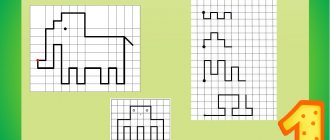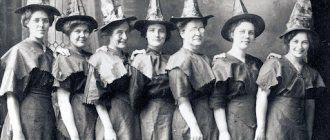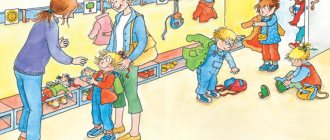Lana Bogomaz
Editor-in-chief of the "Alpina.Children" direction, certified specialist in working with teenagers, author of the idea for the book series for early career guidance "Lessons from Life".
If we look at the atlas of professions of the future, we will find few familiar professions there: virtuality architect, urban ecologist, clothing recycling specialist. The current trend is leading to people inventing their own professions. In a dynamically changing world, it is especially important that a child choose a business based on his preferences and abilities.
And the parent can only ask the right questions without imposing his opinion.
What do you want to be when you grow up?
This question will help you understand whether your child has already thought about what he wants to do, or whether you just have to spark an idea about the future in his head.
Start talking about professions at the age of 10–12; don’t leave this question until high school. There is no point in frightening a child with the words “This is the most important choice in life,” just encourage him to think about his desires, distinguish them from the flow of other people’s ideas and recommendations.
It is important not so much what profession the children choose, but the reason why they chose it. It is quite possible that you will receive the answer “I want to be a dentist like dad” or “A programmer because they get paid a lot.” This is a characteristic sign that the child makes choices based on understandable models, such as the example of parents or the opinion of society.
The decision may also be justified by the fact that it is easier to enter a university in the chosen specialty. This approach only seems practical. As a rule, this is a decision that is made at the last moment, when the alternative is not to enroll anywhere and lose a year. To make an informed choice, you need to dig deeper.
How to correctly talk about professions in kindergarten?
Nannies working in kindergarten most often supplement the information that the child initially receives at home. How to properly tell children about the profession?
Each What is the salary of a preschool teacher? The teacher can use the methodology that is provided in the preschool institution, or he likes it himself. Some people choose this option as riddles about professions.
Riddles about professions - an ideal option to keep kids busy in kindergarten
This may be a quatrain, the last word of which is the answer or the name of the profession. Naturally, it will rhyme, and looking at the picture, the child will be able to say what profession is implied in this poem.
Ordinary riddles are also popular, in which cards with the image of a person of a certain specialty can also serve as an assistant. You can also divide existing professions into groups and logically combine them - this will make it easier for the child to remember the information that adults present to him.
What do you like to do?
It’s enough to remember a hobby or think about what the child likes to do in his free time. Is it difficult for him to answer? It's okay, envy will come to his aid: ask which of his friends he envies and why. A classmate, a football player, or maybe a friend, whom her mother taught to sew stylish clothes. You can learn a lot of interesting things. It would be useful to remember in which lessons at school the child listens to the teacher with interest.
Another good way is to play 10 Lives. Invite your child to come up with 10 scenarios, in one of which he can be a sailor, in another - a film actor or a representative of a more mundane profession - a lawyer. Any options are possible. When we have the required number of scenarios, we change the rules: now out of 10 lives you need to choose only three.
As a result, you will have several favorite or desired activities. Write them down on a piece of paper.
What are you good at?
This question can be difficult to answer even for an adult when filling out a resume. The participation of parents, friends and possibly a school teacher will be required. What request would you make of your child: help with the computer, come up with a cool caption for an Instagram post? Does mathematics or literature come easier to your child? Please note that we are no longer talking about favorite subjects, but about those where the child shows the best results and quickly completes homework. Write down everything that you managed to remember together next to the column of your favorite activities.
The more often you remind your child of what he is doing well, the more motivation he will have to continue doing it. And in this way you form a realistic idea of your capabilities.
Educational stories for children 5–8 years old
Postal workers
Tasks:
– reveal the importance of the postal service of the Russian Federation and its workers, show how postal communication allows people to receive information and exchange it on an equal basis while maintaining the secrecy of correspondence, send and receive necessary goods, money orders, magazines and newspapers (new information), pensions; contact any location in the world; receive additional services;
– introduce postal workers, their job responsibilities, significant personal and professional qualities, and the rules for sending correspondence;
– provide basic knowledge on postal history;
– develop focused attention, auditory perception, memory, dialogic and monologue speech, enrich and activate the vocabulary;
– develop the ability to use your personal experience in a conversation, draw conclusions, express judgments;
– to form a respectful attitude towards postal workers and interest in their activities.
How Anya began to understand her mother
Anya's mom works at the post office as a telecom operator
first class. She has so much work that by the end of the day she is simply overwhelmed. Anya could not understand why her mother was so tired. She was offended when her mother refused to play with her in the evening and went to her room.
One day, the kindergarten that Anya went to was closed for renovations. The mother had to take her daughter with her to work because there was no one to leave her with at home. The mother sat her daughter at the table, gave her a sketchbook, paints and pencils, and asked Anya not to make noise and not to distract her from her work. The girl drew a little, she got bored, and she went to inspect the post office.
The post office where Anya’s mother worked was small and served one of the city’s microdistricts. There were only two booths for long-distance telephone communications.
. In these booths it was possible to talk on the phone with family, friends or business partners living in other cities.
Two more telecom operators, a post office manager and two postmen worked with my mother. During the day, these several people did so much work that Anya even felt dizzy.
Telecom operators, including Anya’s mother, worked with visitors, postmen and workers from the main post office - the most important post office in the city.
Anya approached the department where telecom operator Maria Ivanovna worked. She received and packaged parcels
and
parcels
, entering all the data about them into the computer.
She also gave out parcels and parcels to visitors who came to the post office to receive them. Maria Ivanovna carefully read receipt
and checked it against the passport. Anya asked her:
– Maria Ivanovna, why don’t you immediately hand over the parcel, but instead carefully read some papers?
“I read the recipient’s receipt and passport so carefully so as not to give the parcel or parcel to the wrong person for whom it is intended,” Maria Ivanovna answered seriously. – I also weigh parcels and parcels to check the accuracy of the weight, and check for any damage to the packaging.
“And I would simply give the parcel to the person who came for it,” said Anya, “then there would be no line at all.”
“You can’t do that,” Maria Ivanovna answered in an edifying tone. – Would you like it if someone else received your package or if the toy you were waiting for fell out of it along the way? Do not ask silly questions. Better help me put the parcels in the mail bag. Add and count. Then you can tell me how many are in the bag. Anya got down to business with pleasure. The parcels were not as heavy as parcels, so the girl easily completed her task. She could only count to ten. When there were ten parcels in the bag, Anya told Maria Ivanovna about this.
“Well done, Anechka,” the operator praised the girl, “she completed my task well.” I hire you as my assistant.
“You’re welcome,” Anya answered, “but I still need to help the others.” They should also have assistants.
And Anya went to the department where telecom operator Elena Petrovna worked. There was a long line at her window.
- Why is there such a long line for you? – Anya asked Elena Petrovna.
– Because everyone wants to quickly pay rent or receive a pension
, child benefits,” Elena Petrovna answered, without looking up from the computer and receipts.
Anya immediately realized that Elena Petrovna could not be distracted because she was counting money. The girl went to see what her mother was doing. She quietly sat down next to her and began to watch her mother work. First, mom accepted a stack of registered letters
from a girl.
stamps
on them and entered all the data into the computer.
Then the mother ran a receipt and took money from the girl for sending letters. The grandmother came up to her mother’s window to pick up the girl. She wanted to subscribe to the magazine “Our Garden”. Mom helped grandma fill out the receipt and charged her for the year. Next in line was a woman who bought an envelope, postcard
and stamps from her mother, and the man behind her sent
a money order
. The young man, who was in line behind the man, received a money transfer by presenting his passport.
Anya’s mother did not have a single moment when she could rest. The line didn't end. Working with visitors seemed very difficult to Anna. Elderly people, who had difficulty seeing and hearing, had to explain things for a long time and help in processing postal items. Others wanted to quickly buy an envelope or stamps without waiting in line. People constantly came up and needed to answer some question.
Anya’s mother tried to be polite and reserved with everyone. All visitors were pleased with her and thanked her for her work. Anya wondered how her mother had enough time and patience for everyone?
It's finally time for lunch. Anya, along with her mother and other operators, was able to rest and eat.
In the afternoon, Anya took a closer look at the work of telecom operators with a computer. postal items into it.
and receiving them. Working on a computer required constant attention and concentration. By the end of the day, the operators' eyes were very tired, and their backs hurt from tension. Anya really wanted to help the operators, but, unfortunately, she did not yet know how to use a computer, and children are not allowed to do such responsible work.
Anya realized that the work of her mother and other telecom operators is very responsible. If they format the mail incorrectly, it will not reach the recipient, but will be returned or may be lost. No one would want their letter or parcel to fail to reach its destination.
Anya helped her mother put registered letters into a pile, and then went to the postmen’s room. Together with them, she put newspapers and magazines in compartments on large shelves and in special boxes for those people who go to receive letters, newspapers and magazines by mail. Such boxes
are called
subscriber ones
. But the girl was not allowed to distribute her pension, which postmen deliver to grandparents’ homes. Money is not for children. The postmen left to deliver mail and pensions to homes, and Anya was left alone. She was so tired during the day that she fell asleep right on the chair.
The working day ended, and mother and daughter went home. On the way, we still had to stop at the store to buy groceries, but we had almost no energy left for that. In the evening, Anya no longer felt like jumping and running. Only now did she realize how tired her mother was. The coloring book that the mother bought for her daughter in gratitude for her help remained on the table until the next day.
After the girl went to her mother’s post office, she began to take care of her. Every evening she ran to meet her, brought her slippers, helped her hang up her clothes, and cooked her dinner. Anya wanted her mother to rest and relax after a hard day at work.
Despite the fact that Anya found the work of a telecom operator difficult, the girl liked it. Doing something for people is so important!
Questions and tasks
● Why was Anya offended by her mother? Where did Anya's mother work? What was her job?
● Why did Anya end up at the post office with her mother? What kind of work did Anya’s mother have to do during the working day? What difficulties did she experience in communicating with visitors? What kind of work did other telecom operators do?
● What should a telecom operator be like to do his job well?
● How did Anya behave at the post office? Why did the daughter change her behavior and attitude towards her mother?
● Did you go to the post office with your parents? Tell me.
Vocabulary work:
telecom operator, PO box, receipt, postal item, long-distance telephone communication, parcel, parcel post, registered letter, envelope, postcard, stamp, pension, money transfer.
Car with a white stripe
One day, Vitya and his dad went, as usual, to the railway station to watch the passing trains. This was their favorite pastime. Dad told his son a lot about trains, their purpose, and distinctive features. Electric trains, long-distance passenger trains, and freight trains rushed past.
Suddenly Vitya saw a carriage with a white diagonal stripe on a blue background, an emblem and the inscription “Russian Post”.
-What kind of carriage is this? – Vitya asked his dad. - Somewhat strange, not like everyone else.
- This is a mail car
, - answered dad.
– don’t you know about this? Then I'll tell you. By rail, postal items
(parcels, parcels, letters)
are transported by
postal and baggage trains and postal cars as part of fast passenger trains.
So that everyone can recognize mail trains and carriages, they use distinctive signs: a stripe, an emblem
and an inscription. You saw these signs on the mail car. But you didn’t notice the special beacons that light up and blink. They are called flashing ones. This is also the insignia of the mail car.
“By the way,” dad added, “mail is transported not only by rail, but also by road, air and water transport.” And everywhere such transport is provided with unhindered passage to post offices and post offices.
The train with the unusual carriage stopped. From it, postal workers began to unload bags, load them onto carts and take them somewhere. Vitya noticed that the carriage was guarded by armed men.
- Dad, why are they unloading some bags from the mail car? Why is he being protected? – he asked his father.
“Let’s go up to the carriage and ask the postal workers what they are doing,” the father suggested.
They approached the carriage when the unloading had already finished. Turning to one of the workers, they learned that he was the head of the traveling crew. The boss, whose name was Ivan Vasilyevich, liked that the little boy was interested in his work. He enjoyed talking with father and son and talked about transporting mail by rail.
“Working with mail is very responsible,” Ivan Vasilyevich began, “not a single letter, not a single parcel should go missing or go to the wrong address.” traveling teams transport mail by rail.
with a boss at the head.
They employ conductors and electricians
of mail cars.
You, Vitya, probably know that electricians work with electrical equipment. They service electrical installations that move postal cargo
. There is so much of it and it is so heavy that it would be very difficult to carry so much mail by hand.
In addition, the postal cargo needs to be unloaded
and load it into
the carriage
train
schedule , because all trains on the railway arrive at the station and depart from it at a strictly defined time.
“Vitya, would you like your grandmother to receive, for example, the parcel you sent on time and safely?” – Ivan Vasilyevich turned to the boy.
- Of course I would! - the boy exclaimed. “Otherwise grandma will be very upset.”
– Every person is interested in ensuring that his postal item is delivered on time, is not lost, torn, unstuck, or opened by anyone other than the addressee. What is being done at the post office for this? – continued Ivan Vasilyevich. – Postal items are securely packaged in durable containers (bags) made of cellophane, boxes made of cardboard, special material or plastic. For each postal item, telecom operators issue a receipt and enter information about it into the computer. No strangers can get into the postal vehicle, carriage, or postal premises on the plane
or on
a sea vessel
.
These premises are also equipped with a special alarm system
.
It serves as security
and warns of fire. In addition to the alarm system, there is also an entire postal security unit staffed by armed guards.
What a serious matter this is - transporting mail! Grow up quickly, Vitya, and come to work with us.
“I never thought that mail needed to be protected,” Vitya said thoughtfully, “I thought that only some military facilities needed to be protected.” What a responsible job you have! Can I shake your hand? – the boy turned to Ivan Vasilyevich.
Ivan Vasilyevich smiled, but extended his hand to the boy. His hand was big and strong. Vitya remembered this handshake for a long time. Now, when trains rushed past him and his dad, he always highlighted the postal trains to himself and remembered the conversation with the head of the mail car.
How could you be useful to the world?
Ask your child to remember an episode in his life where he was useful due to his innate qualities. For example, he returned a book that had been delayed for two weeks to the library instead of a shy friend, because he easily finds a common language with people of any age. This quality can be used consciously, and there are many professions where it is useful.
At first glance, this feature may seem neutral or even negative. As in the case of the boy Jim, who had very active facial expressions and could make the most unimaginable faces. Such an ability might just annoy teachers. But Jim noticed that his antics would make people laugh, and he began to do it on purpose to make them cheer up and get positive emotions. Today we know him as the popular comedian and actor Jim Carrey, and lively facial expressions have become his calling card.
Think of a few of your child's standout qualities and come up with useful uses for them. Brainstorm. Let these be the craziest ideas for startups or even new professions. The main rule is to justify why it can be useful to people and why exactly he can do it. Write down everything you come up with in the third column.
Real supermen
Modern children enthusiastically play Spider-Man and other fictional characters who heroically protect the world. However, real people who do not have miraculous devices are much more courageous. Nevertheless, they throw themselves into fire, rise into space, catch criminals and save those in trouble.
Films and books about military professions are much more useful for children than color comics. Boys' games often turn into mindless running around with shootouts borrowed from action movies. The task of parents is to teach them to build full-fledged stories, to introduce them to examples of just struggle (military exploits, actions of rescuers, stories of brave travelers).
Let the main characters of the games not be vampires or mutants, but firefighters, sailors, scouts, and pilots. Together with your child, rescue your captured comrades, put out fires, fight storms, and go on a dangerous flight to other galaxies. And at the same time, meet brave professionals who protect the world from evil in real life.
Where do “I love”, “I can” and “I will be useful” intersect?
Phil Knight, the founder of Nike, loved running (“I love it”), so he began selling running shoes and even, together with his coach Bill Bowerman, came up with a new comfortable sole - waffle. Using his gift of persuasion (“I can”), Phil enlisted the help of famous runner Steve Prefontaine and asked him to compete in the Olympics wearing Nike sneakers. It was a resounding success. So Phil’s love for running inspired millions of people to take up sports (“I’ll be useful”).
Using this story as an example, find with your child the intersections between his “I love”, “I can” and “I will be useful”, and then name several professions that will combine all three factors.
Doman educational cards with people's professions
This is one of the options for introducing children to professions that exist in the world. In this case, the card will have an image of the profession, and the picture will be very bright and simple, easy for the child to remember. This is the easiest option to teach children to understand who is doing what. Such pictures of professions for children will be one of the most convenient learning options.
The pilot profession will be incredibly interesting for your child
There are 122 such cards in total; they provide 5 types, one of which is military professions. On the back of the card there is a word in large letters, on the other side there is an image that indicates this word. Thus, the child’s learning is more interesting, educational, and simple.
What can you do now?
When dreaming of becoming a writer or businessman, we often imagine only the positive aspects of these professions. This error of perception is common even to adults, let alone children. For example, a writer is seen as a person who sits by the fireplace with a laptop and writes novels. He earns money through creativity and does not have to go to work every day. In real life, they rarely become famous writers right away, and sometimes they don’t become famous at all - and they combine creativity with the work of a journalist, copywriter or translator.
To find out what the business the child has chosen actually is, you need to try it. A teenager has many opportunities: volunteering, courses with project activities, and so on. You can work somewhere unofficially.
For younger children, the best option is books and films that tell about the lives of real astronauts, writers and businessmen. Read biographies of outstanding people from the field that interests your child. Offer to play in the profession of his choice, give him simple tasks (for example, write an article about how you went to the theater). If possible, introduce your child to a real businessman, lawyer or journalist. Let him tell you what his working day consists of.
The goals of work in these areas may be different
- Gnostic: recognize, distinguish, evaluate, check (sanitary doctor, literary critic, inspector, merchandiser, expert, investigator).
- Transformative: process, move, organize, transform (driver, painter, teacher, parquet floor worker, mechanic, tailor,).
- Research: invent, come up with, find a new option, design (cutter, marker, breeder, graphic designer)
Modern psychologists and professional consultants have gone further and, based on the above classification, proposed a new one, specifying one or another type. For example, the “person-person” type was divided into two: “social communication” (teachers, doctors, service industry, etc.) and “business communication” (sales manager, HR manager, customer service manager, etc.). d.)
Is it necessary to choose a profession once and for all?
When I ask this question at a master class, ten-year-old children answer “No.” They saw their parents completely change their lives, leave their regular jobs and start their own business or get a second education. But not everyone has such an example before their eyes, so it is important to tell the child that it is also possible to change your decision. It’s normal to lose interest in something you once loved and start doing something completely new. Knowing this, it will be easier to choose a profession.
It has been proven that 90% of the skills that an adult possesses (the ability to play an instrument, knowledge of languages, etc.) were acquired during adolescence, mainly between 11 and 16 years old, when our cognitive abilities are focused on the external world. The more you allow your child to try during this period, the wider his horizons will be.
What methods of career guidance are there?
You can choose a profession in different ways:
- on one's own. Analysis of the child’s interests and inclinations on his own (by mom, dad, with the help of teachers at school);
- consultation with specialists - this could be a school psychologist or a career counselor in a special center; for adults, they are now actively offering coaching services (career coaching);
- testing using computer tests or tests from collections, which are sold in abundance in all bookstores. Along with the questionnaires we cited as an example, there are in-depth projective techniques, for example, the L. Zondi test, the Achtnich career guidance test, etc.);
- active forms of career guidance - trainings that provide the opportunity to “play out” and try on various professions.
In addition, information is an important component of choosing the right profession. Not many parents can boast that they can tell their child absolutely all modern specialties, professions, and the peculiarities of the labor market. It’s a good idea to read electronic or paper encyclopedias about professions, articles about choosing a profession, look at real vacancies, visit open days and special exhibitions (“Education from A to Z”, etc.). By the way, many even among high school students do not know who and how their mother and father work, let alone other specialties!










